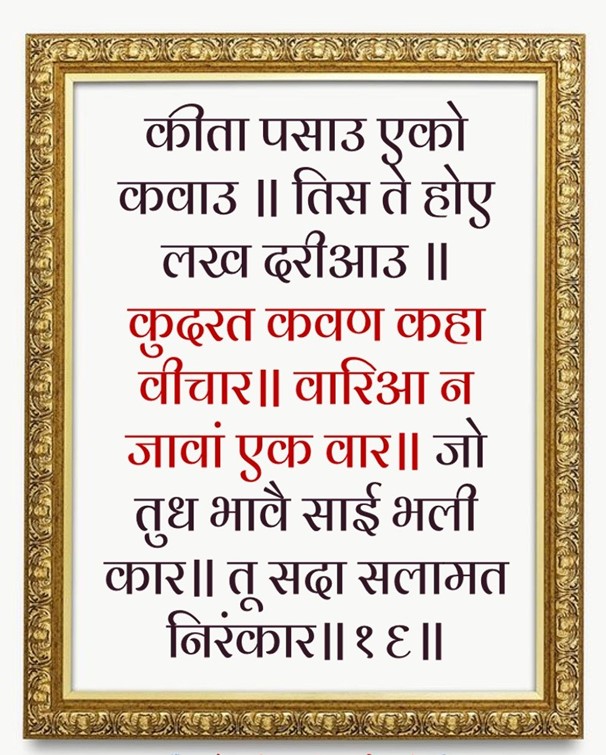Acceptance and Contentment (Hukam and Santokh): Embracing Divine Will
Life often feels like a whirlwind of events, some bringing joy and others testing our strength. Amid this ebb and flow, Sikhism offers profound wisdom through two guiding principles: Hukam (Divine Will) and Santokh (Contentment). These timeless teachings remind us that peace doesn’t come from controlling life but from embracing it with faith and gratitude.
What is Hukam?
Hukam is the belief that everything happens according to Waheguru’s divine will. It’s the understanding that there’s a deeper order and purpose to life, even when things don’t make sense. Guru Nanak Dev Ji captures this beautifully in the opening verses of Japji Sahib:
ਹੁਕਮਿ ਰਜਾਈ ਚਲਣਾ ਨਾਨਕ ਲਿਖਿਆ ਨਾਲਿ॥
(O Nanak, by accepting the Hukam, one walks in harmony with the Divine.)
Think about it – how much energy do we waste fighting circumstances we cannot change? Hukam teaches us to let go of this resistance and flow with life. It’s not about giving up; it’s about trusting that Waheguru’s plan is more significant than we can see.
Finding Peace in Santokh
Santokh, or contentment, is the art of being at peace with what we have and who we are. Japji Saheb, at the beginning of Sri Guru Granth Sahib Ji, tells us:
ਸੰਤੋਖੁ ਥਾਪਿ ਰਖਿਆ ਜਿਨਿ ਸੂਤਿ॥
(Contentment is the foundation upon which true peace resides.)
In a world where we’re constantly told to strive for more, Santokh feels revolutionary. It reminds us that true happiness doesn’t come from chasing material possessions or comparing our lives to others but from cherishing what Waheguru has already given us.
Santokh isn’t about abandoning ambition but balancing aspiration with gratitude. It’s knowing that we are precisely where we are meant to be, whether life gives us success or setbacks.
The Beautiful Connection Between Hukam and Santokh
Hukam and Santokh go hand in hand. When we accept life as it unfolds through Hukam, contentment naturally follows. And when we practice Santokh, we find it easier to trust in Waheguru’s divine will. Together, they create a sense of calm and resilience that helps us navigate even the toughest challenges.
A shining example of this is Guru Arjan Dev Ji’s life. During his martyrdom – a time of unimaginable suffering – he ultimately accepted Hukam. With serenity and unwavering faith, he transformed his pain into a message of love and courage. His life teaches us that when we embrace Hukam and live with Santokh, we can find strength in even the darkest moments.
How Can We Live with Hukam and Santokh?
- Lean on Gurbani for Guidance: The wisdom in Gurbani is a treasure trove for navigating life’s ups and downs. Verses from Japji Sahib or Sukhmani Sahib offer comfort and clarity, reminding us of the bigger picture.
- Practice Gratitude Daily: Gratitude is a powerful way to cultivate Santokh. Every day, thank Waheguru for your blessings, big and small. Even saying “Dhan Waheguru” can shift your perspective.
- Engage in Seva (Selfless Service): Helping others connects us to Waheguru’s creation and softens our attachment to material desires. It’s a way of aligning our actions with Hukam.
- Meditate on Naam (Divine Name): Chanting Waheguru’s name brings peace to the mind and soul. It helps us quiet the world’s noise and tune into the divine presence within.
- Let Go of Control: This is the most challenging but liberating step. Life is unpredictable, and trying to control every aspect only leads to frustration. Surrendering to Hukam doesn’t mean passivity but finding peace by trusting Waheguru’s wisdom.
A Life of Grace and Gratitude
Living with Hukam and Santokh doesn’t mean life will be free of pain or struggle. But it does mean we’ll face life with a heart anchored in faith and a mind rooted in peace. Sikhism reminds us that we are part of a divine design – one that is far more intricate and beautiful than we can imagine.
When we embrace Hukam, we stop asking, “Why me?” and say, “Thank you, Waheguru, for guiding me.” When we practice Santokh, we stop yearning for what we lack and celebrate what we have. Together, they open the door to a life of true joy, purpose, and connection.
So, the next time life feels overwhelming, pause and remember:
ਜੋ ਤੁਧੁ ਭਾਵੈ ਸਾਈ ਭਲੀ ਕਾਰ ॥
(Whatever pleases You, O Lord, is the best action.)
Let this remind you that you’re exactly where you’re meant to be, held by Waheguru’s grace.


Leave a Reply